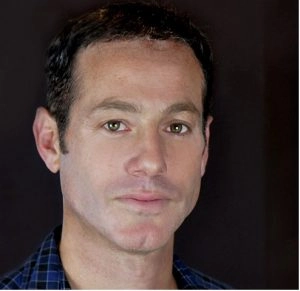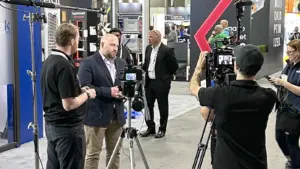Price Wars: Redefining the Wireless Carrier Landscape with Stephen Stokols of FreedomPop
Cell phones are an expensive investment, but a standard one, and now more than ever, companies are fighting to get customers on their plans. Whether it’s Verizon now offering unlimited data, AT&T offering free HBO subscriptions, or T-Mobile being so bold as to pay for your latest Netflix binge, companies are getting inventive. Even more inventive could be FreedomPop’s method: a freemium business plan that currently keeps over 50 percent of active users paying zero dollars for their wireless data.
Today, Stephen Stokols, the CEO of FreedomPop, joins us to talk about the effects of unlimited plans, the Sprint and T-Mobile merger, and the intricacies of a freemium business plan model to help you make better sense of the digital wireless carrier landscape.
Michael Sartini: If you’re listening to this podcast, it’s safe to say that you love technology. But technology can sometimes get really expensive especially when it comes to cellphones because not only do you have to buy the phone itself, but you’ll also have to buy a carrier plan either to really use the phone. Verizon, AT&T, Sprint, T-Mobile, these are the four main carrier companies fighting over you and your wallet. And these companies are going to the absolute extremes to entice you to join their plans.
Some offering free calls and texts, others offering free data across the board. These deals are getting crazy. Joining us today to talk about the price wars that are redefining the digital wireless carrier landscape is Steven Stokols, the CEO of FreedomPop, the first company to offer completely free carrier plans. Welcome to the Software and Electronics Podcast. Brought to you by MarketScale. I’m your host, Michael Sartini. Let’s get right into it.
Now you’ve got a really interesting background and I would love if you could share with our listeners your journey thus far and how you came to become the CEO of FreedomPop.
Stephen Stokols: Yeah. So I got a very unique background as you alluded to, both big company, senior executive position in big companies as well founding startups. And if you go back about 10 years ago, I was the number two guy in Bruce Telecom, which is sort of the Verizon of the UK, a massive wireless broadband carrier in the UK. I work directly for the CEO there. I was in charge with all their innovation and I had kind of come up fast track through corporate ranks and left there at the height. As the youngest sort of Senior Vice-President in the organization, I left to start my own internet company about nine years ago.
 At the time, it was an interactive video browser meant to really enable small businesses to rapidly file through different candidates and improve the recruiting process. But unbeknownst to me, what it turned to be is a speed dating app. So before I knew it, I was 10 million speed dating users and the CEO of a dating application, which again it wasn’t my desired career trajectory, but what it did do is put me in a real gut, in the armpit of the internet, the dating space. A couple of my big company wireless telecom experience was a real valuable sort of asset.
At the time, it was an interactive video browser meant to really enable small businesses to rapidly file through different candidates and improve the recruiting process. But unbeknownst to me, what it turned to be is a speed dating app. So before I knew it, I was 10 million speed dating users and the CEO of a dating application, which again it wasn’t my desired career trajectory, but what it did do is put me in a real gut, in the armpit of the internet, the dating space. A couple of my big company wireless telecom experience was a real valuable sort of asset.
I sold that company for a decent return in 2011 and then FreedomPop was really the convergence of big company wireless, everything I learned in the internet space, we call it a webco, sort of a telco, it’s all digital, leverages all internet technologies, acquisition, conversion, et cetera, even the business model itself is freemium which is unheard of in the wireless space. But that really sort of brings together my background which like I said is somewhat unique having sort of very executive level of experience in a big company as well as successfully starting some startups as well.
MS: Definitely. You’re just such an expert in so many different fields. Let’s touch on the wireless field specifically for a second. Would you mind providing us some context into the last few years of price drops in the mobile carrier world?

SS: Yeah, absolutely. So if you look at the price drops, we started this FreedomPop about five and a half, six years ago. Prices were significantly higher and if you look even on the wholesale level, where you buy data from carriers, LTE was just taken off and it was $10, $15 a gigabyte. What happened in the last five years is the cost has really come down significantly which is projected, right? The networks get more efficient, new technologies come in like small or so, and the overall load on the networks increases the actual cost per user has come down.
So what kind of happen about three years ago and FreedomPop has been attributed some credit in kicking off price wars. We were kind of the first to come in with significantly little prices, a free plan for low usage. It pissed off T-Mobile significantly. They actually took a couple of pages out of our playbook a few years ago and they started competing pretty aggressively on price. For the Uncarrier thing, they copied our data rollover. That was one of the first things they kind of launched. We invented the rollover. They sort of copied that and started lumping that with plans. And Sprint, at the same time, was undergoing new management with SoftBank and Marcelo coming in as a CEO. Sprint’s Network was admittedly the worst of the carriers and so they had a pretty clear mandate to compete on price.
SS: So what kind of happen over in the last really two years is you saw significant increases on price and it took two ways. One, prices actually have come down, about 15% or 20% over that period. So if you look at the ARPUs on carriers are actually down some. But then in addition, the other part of the equation is the data has gone from limits. It used to be 4 or 5 gig limits to unlimited for the most part across the board. So you’ve got more data in a lower price. But if you look at the actual price that a consumer pays per gigabyte of data, that’s where you got significant drops. Now the price on the plan might have been 60 bucks historically and now it’s 55 or 50, but the price per gig used to be 12 or 13 bucks and now it’s 2 or 3.
So that’s really kind of flattened out recently. I think the T-Mobile, Sprint merger that’s proposed will probably stabilize price even further, but you have seen some nice price drops for the consumer in the last few years.
MS: Yeah, definitely. You guys seem to really be making a lot of noise in the space and even getting other big companies to sort of take some of your work. It’s really cool. Could you elaborate into sort of the reemergence of unlimited data plans coming into the space?
 SS: Absolutely. I mean ultimately carriers only want to drop prices so much. So what happens is you start to compete on data. So if you don’t want to go below 45 bucks a month because you are [inaudible 00:07:19] revenues and start being cannibalized, at 40 bucks, you used to get your 5 gigs and then you want to keep it a 40, so it’s now 10 gigs and then you get to a point where… I think Sprint actually took the gloves off first and said, “Screw that. We’re going unlimited.” So they start to compete on data and it’s gone now up to the point where it’s unlimited. And again, the positive effect of that is the entire market now is gone unlimited, whether it’d be Verizon, AT&T, Sprint, and T-Mobile.
SS: Absolutely. I mean ultimately carriers only want to drop prices so much. So what happens is you start to compete on data. So if you don’t want to go below 45 bucks a month because you are [inaudible 00:07:19] revenues and start being cannibalized, at 40 bucks, you used to get your 5 gigs and then you want to keep it a 40, so it’s now 10 gigs and then you get to a point where… I think Sprint actually took the gloves off first and said, “Screw that. We’re going unlimited.” So they start to compete on data and it’s gone now up to the point where it’s unlimited. And again, the positive effect of that is the entire market now is gone unlimited, whether it’d be Verizon, AT&T, Sprint, and T-Mobile.
So the consumers now are used to unlimited in the US market. It’s even forced FreedomPop which has trouble with unlimited because we buy data from the carriers to come out with an unlimited brand called Unreal Mobile, which is unlimited plans. The whole market is gone. It’s better for the consumer. I think ultimately, the sustainability of unlimited is something that’s been raised so you’ll probably see caps on the unlimited usage and right now even the most aggressive unlimited plans actually do have caps generally like 20, 25 gigs. But you’ll see called gimmicks with the unlimited, but I think the reality is unlimited was a way to really kind of decrease pricing without decreasing ARPU.
MS: And how do you really start competing with these big carriers?
SS: That’s a great question because when you look at it, I mean big carriers are spending billions per quarter on marketing. So when you talk about competing with them, on multiple levels, on one hand, you have to out-innovate them, and I think the fact that they adapted a lot of our value-added services and some of our approaches is one way in which we have sort of led on innovation side.
On another level, they’re starting encroach further and further, so we are all digital, meaning all our acquisition, we have thousands of online distribution channels. But the reality is in the space, still in 2018, most of the consumption is about 80% is done offline. So to really sort of shake up the big carriers, you need to move from online-offline, which is kind of contrary to where everybody else is trying to go. So we’ve actually started to move from online-offline specifically going national with Target. We’re going national with Best Buy and offline channels and really starting to encroach on the territories where carries sort of do a lot of their distribution.
 And then the third element really is, look, at the end of the day, if you’re 100 the size of rice in your mass of company but also having an impact on the market like I just alluded to isn’t necessarily being the only provider, but it’s impacting the markets through innovation, et cetera. What we’ve actually done is we’ve started to take some of our proprietary technology where we’re able to kind of acquire customers online very effectively or we’re able to convert subscribers using machine-learning algorithms to very precisely understand what value-added service is best for the right subscriber.
And then the third element really is, look, at the end of the day, if you’re 100 the size of rice in your mass of company but also having an impact on the market like I just alluded to isn’t necessarily being the only provider, but it’s impacting the markets through innovation, et cetera. What we’ve actually done is we’ve started to take some of our proprietary technology where we’re able to kind of acquire customers online very effectively or we’re able to convert subscribers using machine-learning algorithms to very precisely understand what value-added service is best for the right subscriber.
We started to license the technology to carriers outside the US because when we look at it, we say look, “As long as we’re sort of making life better for consumers, enabling lower prices because they can convert another services or innovation, we’re more than happy to actually take that capability and license it to carriers, big carriers to use.” So if you look in Italy, the biggest carrier in Italy is one of our clients, Greece, we’re sending somebody up in the UK.
So on one hand in the US, I think we’re starting to encroach and obviously distribution, the more mass distribution start move in on big carrier turf, and on the same notion outside of the US, starting to license our capabilities to enable and to power some of the other world’s biggest carriers is also in play.
For the latest news, videos, and podcasts in the Software & Electronics Industry, be sure to subscribe to our industry publication.
Follow us on social media for the latest updates in B2B!
Twitter – @TechMKSL
Facebook – facebook.com/marketscale
LinkedIn – linkedin.com/company/marketscale








